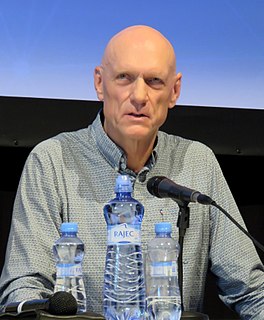A Quote by Mary Matalin
"Thank You for Being Late" pinpoints 2007 as the year what he calls the, quote, great acceleration began, ushering in a dizzying and disorienting era of change - technological, economic, environmental. Dealing with that change, the challenge of our time, says Tom Friedman. He's here to explain it right now.
Related Quotes
...the world needs to face up to the challenge of climate change, and to do so now. It is clear that climate change poses an urgent challenge, not only a challenge that threatens the environment but also international peace and security, prosperity and development. And as the Stern report showed, the economic effects of climate change on this scale cannot be ignored, but the costs can be limited if we act early
But no matter how big the effort to push a propaganda line might be, climate change is bigger. This, undoubtedly and regrettably, is the biggest immediate long-term environmental challenge we face. A failure to concretely come to some policy outcome on climate change has not only a negative environmental impact but also social and economic consequences for us.
If we hope to stem the mass destruction that inevitably attends our economic system (and to alter the sense of entitlement - the sense of contempt, the hatred - on which it is based), fundamental historical, social, economic, and technological forces need to be pondered, understood, and redirected. Behavior won't change much without a fundamental change in consciousness. The question becomes: How do we change consciousness?
So, we've gone from covered wagons to going to the moon in just under 100 years. For all the centuries and thousands of years before us, people walked or rode horses, cows, camels or whatever. This so-called modern era, from the late 19th century through now, has been the period of the most amazing development, discovery, innovation and acceleration of change that humans have ever experienced. And it hasn't slowed down yet.
There's always new work to do. Adjusting to the rapid pace of technological change creates real challenges, seen most clearly in our polarized labor market and the threat that it poses to economic mobility. Rising to this challenge is not automatic. It's not costless. It's not easy. But it is feasible.
The end of an age is always a time of turmoil, war, economic catastrophe, cynicism, lawlessness and distress. But it is also an era of heightened challenge and creativity, of issues, and their world-wide scope, never has an era faced a more demanding and exciting crisis. This then, above all else, is the great and glorious era to live in, a time of of opportunity, one requiring fresh and vigorous thinking, indeed, a glorious time to be alive.



































